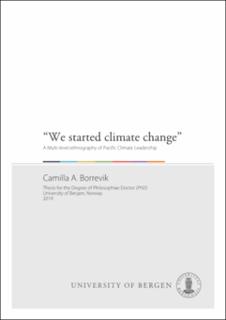| dc.description.abstract | Based on fieldwork in multiple locations around the world but with a particular focus on the Pacific Islands region, this dissertation explores ethnographically the global phenomena of anthropogenic climate change and their disparate local implications. For Pacific Islanders, the term ‘climate change’ encompasses a wide array of experiences and understandings, ranging from everyday struggles with floods, to intergovernmental negotiations on a global scale at the United Nations. In this study, I set out to explore how climate change unfolds in the Pacific region not only as environmental impact, but as part of political processes, within documents and as political position-making. The latter refers to the advances made by Pacific countries nationally, regionally, and globally in order to position themselves within global climate change discourse and international climate change decision-making. The study draws on ethnographic fieldwork carried out in the Pacific countries of Palau, Fiji, and Solomon Islands, as well as at the Third International Meeting on Small Island Developing States (UNSIDS) in Samoa, 2014, and international climate negotiations at the Conference of the Parties (COP) to the United Nations Framework Convention on Climate Change (UNFCCC) in 2015 (COP21, Paris), 2016 (COP22, Marrakech) and 2017 (COP23, Bonn). Based on these diverse field sites, I suggest an approach to climate change as a relation; in which capacity it is something that connects us and in the process is created and re-created. As such, this study explores knowledges and linkages between local understandings of climate change and international processes at different levels. The point of departure is an argument that Pacific stories about climate change convey forms of knowledge and insights into aspects of life that international climate change processes frequently separate out or ignore altogether. Notions of storytelling, kinship, place and sociality are important in Pacific knowledge-sharing practices and are therefore at the centre of this analysis. I propose the concept of Pacific climate change stories, which reflects the empirical cases presented and convey experienced local realities of climate change. In terms of theoretical and methodological contributions, the study demonstrates the applicability of an analytical approach that conceptually expands on Pacific notions of stories and storytelling. These forms of narrative and rhetorical genres serve as important tools for creating the relation required in order to get others to understand what climate change means for Pacific Islanders. The sharing of a story may serve as a powerful tool to connect climate change to place and people. The study contributes to contemporary scholarly debates on climate change within anthropology and responds to methodological calls for in-depth empirical research. By taking an approach of ‘studying through’, the focus is on decision makers, institutions and bureaucracies, as well as ‘on the ground’ events, situations, and contexts in Palau, Solomon Islands, and elsewhere, including on the scale of the Pacific as a particular social, cultural and political region of the world. Through this method, entanglements in Pacific island countries between ‘grassroots’ and ‘elites’, as well as politics and kinship, emerge, reflecting a density of global-local connections. Despite the study’s analytical advancement of a multi-level, multi-sited and multi-scalar ethnography, I argue for a renewed notion of locality that postulates exactly such global entanglement and multi-scalarness. Ideas of ‘the local’ can in that sense take on new meanings and purposes, as they ‘travel’ through stories and people. The relationship between people and place becomes increasingly important due to the strong ‘global imaginary’ of climate change, yet with highly unequal local implications. A further elaboration of these arguments reveals that through the development of a distinctive Pacific climate diplomacy, a conversion of Pacific climate change stories takes place and gains influence in the realm of global climate governance. Stories of climate change as expressed in different forms by Pacific delegates at the global stages, carry the authority of lived experiences of climate change in multifaceted ways and represent a distinctive authenticity in COP settings. Hence I argue that Pacific delegations have developed a strategy to create spaces at COPs to voice concerns and incorporate formal mechanisms that make place relevant and value Pacific-based approaches of knowledge-sharing. This strategy stands in contrast to the often systemheavy and bureaucratic processes characterising the UN systems. In a desire to move away from existing system-oriented practices, Pacific countries have developed a greater Pacific regional voice, and a distinct regional approach of Pacific climate leadership. This involves the building of global positioning of the Pacific in climate change politics, and requires a specific repertoire of a Pacific climate diplomacy. | en_US |
